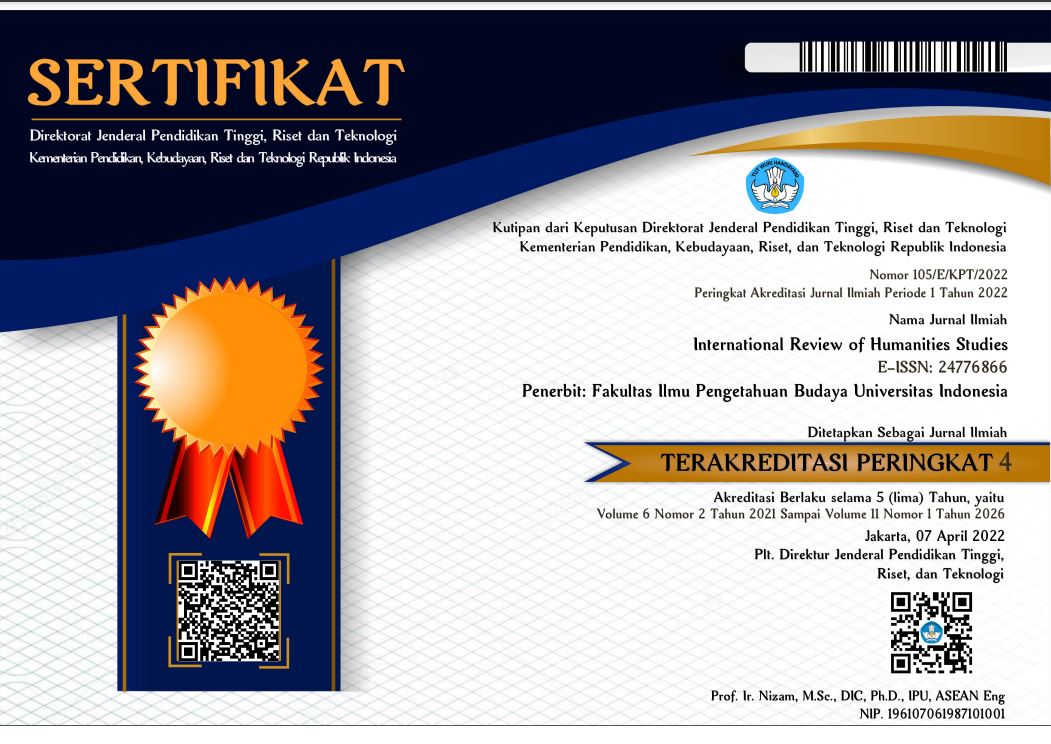International Review of Humanities Studies

Abstract
In 2018, the Language Comission of the Ministry of Education and Culture (Kemendikbud) of the Republic of Indonesia has made verification towards all the languages that exists in Indonesia. The verification conducted from 1991 to 2017 resulted in 652 languages to be found. That number still does not include the dialects and their sub-divisions of the 652 languages. Meanwhile, UNESCO recorded 143 languages based on their vitality status. Identity can be interpreted as similarity or unity with others in a certain area or other things (Rummens, 1993: 157-159). "The identity possessed by an individual can be in the form of personal identity and social identity" (Santoso, 2006: 44-45). Using statistical data on language issued by the Indonesian Central Bureau of Statistics as a corpus and literature study by tracing the title of mainstream online media coverage related to the use of code mixing, identity theory, and the concept of intercultural communication, this paper discusses the relationship between the use of code mixing in the Indonesian people's everyday life with the nation‟s identity as a country that is bhineka (mentioned as its official national motto) or diversed. Instead of being not nationalist, the practice of code mixing by the Indonesian people is actually a manifestation of the identity of the Indonesian people as a diverse society. The code mix that occurs in the daily life of the community is proof that Indonesian people can understand each other and communicate well in a very complex diversity
References
Ali, Lukman, Ikhtisar Sejaraah Ejaan Bahasa Indonesia (Jakarta: Pusat Pembinaan dan Pengembangan Bahasa Departemen Pendidikan dan Kebudayaan, 1998)
Alisjahbana, S. Takdir, The Indonesian Language-By-product of Nationalism (Pacific Affairs, University of British Columbia, 1949), 388 – 392.
Alisjahbana, S. Takdir, Language Planning for Modernization the case of Indonesian and Malaysian (The Hague: Mouton, 1976)
Anwar, Khaidir, Probems of Development and Use of A National Language (London: School of Oriental and African Studies, University of London, 1976)
Ashcroft, Bill, Key Concepts in Postcolonial Studies (London: Routledge, 1998)
Benda, Harry J., The Beginnings of the Japanese Occupation of Java (Association for Asian Studies, 1956), 541 – 560.
__________, Dari perjuangan dan Pertumbuhan Bahasa Indonesia (Jakarta: Penerbit Dian Rakyat, 1988)
Anwar, Rosihan, Menulis Dalam Air: Sebuah Otobiografi (Jakarta: Sinar Harapan, 1983)
Beer, William R & Jacob, James E, Language Policy and National Unity (New Jersey: Rowman &Allanheld, 1985)
Bourdieu, Pierre, Language and Symbolic Power (Cambridge: Harvard University Press 1991)
Elson, R.E., The Idea of Indonesia: Sejarah Pemikiran dan Gagasan (Jakarta: Serambi, 2009)
Mestika, Monica Gita, Posisi Pemerintah Hindia-Belanda dalam Pembentukan Bahasa Indonesia (2018)
Na'im, Akhsan & Syahputra, Hendry, Kewarganegaraan, Suku Bangsa,Agama, dan Bahasa Sehari-hari Penduduk Indonesia: Hasil Sensus Penduduk 2010 (Badan Pusat statistik, Jakarta: indonesia, 2010)
Ricklefs, M.C., Sejarah Indonesia Modern 1200-2004 (Jakarta: Serambi, 2005)
Schiffman Harold F., The Politics of Language. Linguistic, Culture, and Language Policy (London: Routledge, 1996
Recommended Citation
Nugraha, Fajar Muhammad
(2019)
"CODE MIXING AS A FORM OF INDONESIAN IDENTITY BASED ON THE MOTTO OF BHINNEKA TUNGGAL IKA,"
International Review of Humanities Studies: Vol. 4:
No.
1, Article 7.
Available at:
https://scholarhub.ui.ac.id/irhs/vol4/iss1/7
Included in
Anthropology Commons, Arts and Humanities Commons, Communication Commons, Constitutional Law Commons, Cultural Heritage Law Commons, Economics Commons, Environmental Studies Commons, First Amendment Commons, Human Rights Law Commons, International and Area Studies Commons, Law and Philosophy Commons, Law and Politics Commons, Legal Studies Commons, Political Science Commons, Public Affairs, Public Policy and Public Administration Commons, Rule of Law Commons, State and Local Government Law Commons


